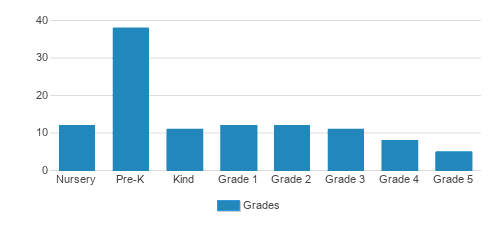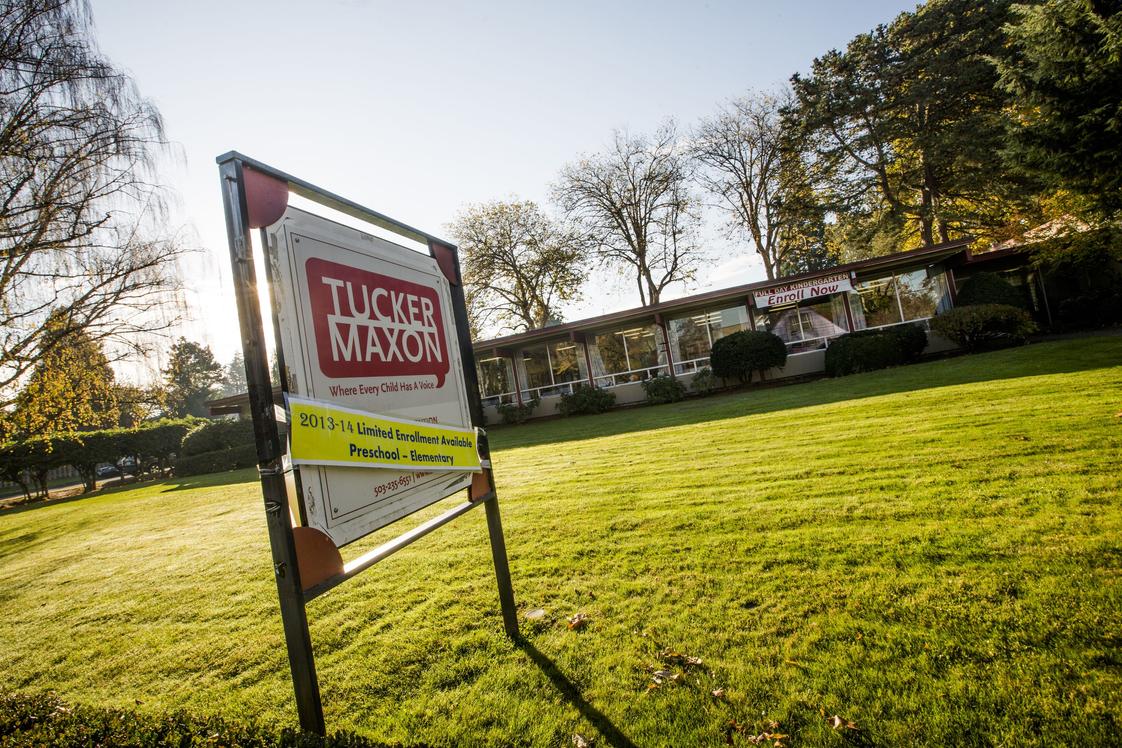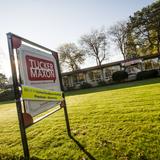At Tucker Maxon, we co-enroll typical hearing children and children who are deaf or hard of hearing together in small, collaborative classes.
We are focused on academic achellience and emotional intelligence.
In 2018-19, 65% of our students have typical hearing.
Our students who are deaf do not use sign language.Instead, with the help of digital hearing aids, cochlear implants, early diagnosis,Listening and Spoken Language (LSL) and early intervention, our students who are deaf learn to listen and talk.
We provide on-site audiology, speech language pathology, and early intervention for our deaf students.
Financial aid options are available, for children who are deaf or hard of hearing and the first three months of early intervention is provided for free!
All students benefit from our highly-qualified teachers, low student-teacher ratios (1:8), and an environment where individual attention is the norm.
Our campus features a gym with a rock-climbing wall, a tree house classroom, a green house, and an organic garden with chickens and goats.
PE is offered daily, and art, science, and music classes are provided weekly.
Tucker Maxon's unique and diverse students make up the fabric of our community.Their differences provide opportunities to learn valuable lessons in social and emotional intelligence, such as empathy, respect, and communication. .
Quick Stats (2025)
- Top Ranked OR School
- Grades: Prekindergarten-5
- Enrollment: 111 students
- Yearly Tuition: $8,500
- Acceptance rate: 90%
- Average class size: 12 students
- Application Deadline: None / Rolling
- Source: Verified school update
Top Rankings
Tucker Maxon School ranks among the top 20% of private schools in Oregon for:
Category
Attribute
Advanced Degrees
School History
School Overview
School Membership(s)School Assoc.
Religious Affiliation
Grades Offered
Grades Prekindergarten-5
Learning Difference Programs
Yes
Learning Programs Supported
Deaf and Hard of Hearing
Year Founded
1947
Summer School Offered
Yes
Summer Program Details
School Calendar
Student Body
Total Students
111 students
Student Body Type
Co-ed
% Students of Color
22%
State avg.: 25%
Students by Grade

Academics and Faculty
Total Classroom Teachers
13 teachers
Student : Teacher Ratio
9:1
National avg.: 13:1
% Faculty w/Advanced Degree
98%
Average Class Size
12 students
List of Courses Offered
Matriculation DataMatric. Data
Classroom Dress Code
Casual
Tuition and Acceptance Rate
Admission Deadline
None / Rolling
Yearly Tuition Cost
Tuition Notes
The tuition figure above is for preschool students with typical hearing. Financial aid is available to students with hearing loss based on a demonstrated need.
% on Financial Aid
35%
Average Financial Aid Grant
$7,600
Acceptance Rate
90%
National avg.: 85%
Admissions Director
Patty Smith
Extracurriculars
Total ExtracurricularsTotal Extra-curric.
3 extracurriculars
ExtracurricularsExtra-curric.
Extended Care
Club or Organization:
Lego League
Arts and Music Programs:
Tucker Arts Camp
Club or Organization:
Lego League
Arts and Music Programs:
Tucker Arts Camp
School Notes
- Founded in 1947, Tucker Maxon School (TMS) co-enrolls deaf and hearing children and provides every child a comprehensive Preschool to 5th grade education. Our mission is to teach children who are deaf and hearing to listen, talk, and achieve excellence together. The communication modality we teach our children who are deaf and hard of hearing (D/HH) is called Listening and Spoken Language (LSL) which means our teachers and specialists instruct deaf students how to use hearing aids, cochlear implants, and personal FM systems to help them listen and talk. Teaching LSL is highly successful in a learning environment where children who are deaf and children with typical hearing are integrated; children of varying hearing levels can help each other learn how to listen and speak. These peer relationships help children to overcome hurdles in communication. Through this process of learning how to listen and talk to each other, our children often learn valuable lessons in social and emotional intelligence, such as empathy, understanding and respect for differences. TMS is the only school in Oregon that uses this integrated approach. We serve approximately 110 children annually at TMS. Services we provide include: Early Intervention (EI): Our EI Teacher helps parents of D/HH children ages 0-3 years be their "first teachers" of LSL, with home/onsite visits. Parents learn to help their child listen and talk. Tele-intervention (EI through video conference) is provided for remote families. EI is free of charge for the first three months at TMS. Preschool: TMS creates a LSL-focused environment in small classroom settings. Our 1:8 teacher to student ratio allows for individual attention and LSL development. Pass-around-microphones are used in each preschool classroom to help young D/HH children hear their peers. Elementary: TMS offers kindergarten through 5th grade instruction that meets all Oregon State standards. We offer daily PE and weekly art and music classes. Our campus includes a large outdoor play area with an organic garden, chickens and goats. Our gym has a rock climbing wall built entirely by parent volunteers. Each classroom is equipped with new digital FM systems; each teacher wears a microphone that transmits their voice directly to a child`s hearing aid or cochlear implant. Audiology and Speech: D/HH children at TMS have a weekly check-in with our on-site audiologist and speech language pathologist to ensure that their equipment is working and their LSL is developing.Recent Accomplishments:-Tucker Maxon is one of 42 schools in the US to focus on LSL services for children who are D/HH. We are one of only five schools in the country to exceed the OPTION Schools standard of excellence (OPTION is an international non-profit organization which advances excellence in LSL education). - 90% of Tucker Maxon alumni go to college.
Source: Verified school update
Frequently Asked Questions
How much does Tucker Maxon School cost?
Tucker Maxon School's tuition is approximately $8,500 for private students.
What is the acceptance rate of Tucker Maxon School?
The acceptance rate of Tucker Maxon School is 90%, which is higher than the national average of 89%.
Does Tucker Maxon School offer a summer program?
Yes, Tucker Maxon School offers a summer program. Visit their summer school page for more information.
What is Tucker Maxon School's ranking?
Tucker Maxon School ranks among the top 20% of private schools in Oregon for: Highest percentage of faculty with advanced degrees and Oldest founding date.
When is the application deadline for Tucker Maxon School?
The application deadline for Tucker Maxon School is rolling (applications are reviewed as they are received year-round).
In what neighborhood is Tucker Maxon School located?
Tucker Maxon School is located in the Reed neighborhood of Portland, OR.
School Reviews
Endorse Tucker Maxon School. Endorsements should be a few sentences in length. Please include any comments on:
- Quality of academic programs, teachers, and facilities
- Availability of music, art, sports and other extracurricular activities
- Academic or athletic awards
Recent Articles

A Parent's Guide To Understanding High School Teaching Methods
This comprehensive guide helps parents navigate the various teaching methods used in today's high school classrooms. By understanding these approaches, you'll be better equipped to support your teen's learning journey, communicate effectively with teachers, and create a complementary learning environment at home.

February 08, 2025
Social Emotional Learning: Education's Hidden SymphonyA musician's perspective on Social Emotional Learning reveals how this educational framework orchestrates success through five essential emotional competencies.

January 24, 2025
A Roadmap For Starting A Private SchoolUse this roadmap as a set of talking points with your trusted mentors and professionals to start the private school of your dreams. You're not alone. Over the years, hundreds of folks like you have had the same dream. From Quintilian to Maria Montessori to Lucy Madeira Wing, visionary educators have established schools to teach according to their beliefs and methodologies.























